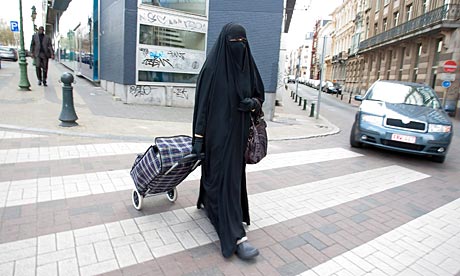istory


Under the new Italian law wearing a niqab would be illegal. Photograph: Julien Warnand/EPA
An Italian parliamentary commission has approved a draft law banning women from wearing veils that cover their faces in public.
The draft, which was passed by the constitutional affairs commission on Tuesday, would prohibit women from wearing a burqa, naqib or any other garment that covers the face in such circumstances. It would expand a decades-old law that for security reasons prohibits people from wearing face-covering items such as masks in public places.
Women who violate the ban would face fines, while third parties who force women to cover their faces in public would be fined and face up to 12 months in jail.
Italy is the latest European country to act against the burqa. France and Belgium have banned the wearing of burqa-style Islamic dress in public, as has a city in Spain. The Belgium law cited security concerns.
The Italian law was sponsored by Souad Sbai, a Moroccan-born member of Silvio Berlusconi's conservative Freedom People party, who said she wanted to help Islamic women integrate more into Italian society.
"Five years ago, no one wore the burqa [in Italy]. Today, there is always more. We have to help women get out of this segregation ... to get out of this submission," Sbai said in a telephone interview. "I want to speak for those who don't have a voice, who don't have the strength to yell and say, 'I am not doing well.'"
The spokesman of an Islamic group said banning the Islamic veil "is unjust and touches individual liberty".
"This topic continues to be a sort of criminalisation and media dramatisation. In Italy, there aren't even 100 women who wear the niqab, and not even one who wears the burqa," Roberto Hamza Piccard, spokesman for the Union of Islamic Communities in Italy, was quoted by the news agency Ansa as saying. He said such a ban would isolate devout Muslim women, who would not be able to leave their homes.
Ansa said the main opposition party voted against the law. The draft will be forwarded after the summer recess to parliament, where Berlusconi's governing coalition has a narrow majority.
The preliminary approval was welcomed by lawmaker Barbara Saltamartini, vice-president of the Freedom People party caucus in the lower house.
"Final approval will put an end to the suffering of many women who are often forced to wear the burqa or niqab, which annihilates their dignity and gets in the way of integration," Saltamartini said.
The draft, which was passed by the constitutional affairs commission on Tuesday, would prohibit women from wearing a burqa, naqib or any other garment that covers the face in such circumstances. It would expand a decades-old law that for security reasons prohibits people from wearing face-covering items such as masks in public places.
Women who violate the ban would face fines, while third parties who force women to cover their faces in public would be fined and face up to 12 months in jail.
Italy is the latest European country to act against the burqa. France and Belgium have banned the wearing of burqa-style Islamic dress in public, as has a city in Spain. The Belgium law cited security concerns.
The Italian law was sponsored by Souad Sbai, a Moroccan-born member of Silvio Berlusconi's conservative Freedom People party, who said she wanted to help Islamic women integrate more into Italian society.
"Five years ago, no one wore the burqa [in Italy]. Today, there is always more. We have to help women get out of this segregation ... to get out of this submission," Sbai said in a telephone interview. "I want to speak for those who don't have a voice, who don't have the strength to yell and say, 'I am not doing well.'"
The spokesman of an Islamic group said banning the Islamic veil "is unjust and touches individual liberty".
"This topic continues to be a sort of criminalisation and media dramatisation. In Italy, there aren't even 100 women who wear the niqab, and not even one who wears the burqa," Roberto Hamza Piccard, spokesman for the Union of Islamic Communities in Italy, was quoted by the news agency Ansa as saying. He said such a ban would isolate devout Muslim women, who would not be able to leave their homes.
Ansa said the main opposition party voted against the law. The draft will be forwarded after the summer recess to parliament, where Berlusconi's governing coalition has a narrow majority.
The preliminary approval was welcomed by lawmaker Barbara Saltamartini, vice-president of the Freedom People party caucus in the lower house.
"Final approval will put an end to the suffering of many women who are often forced to wear the burqa or niqab, which annihilates their dignity and gets in the way of integration," Saltamartini said.
No comments:
Post a Comment